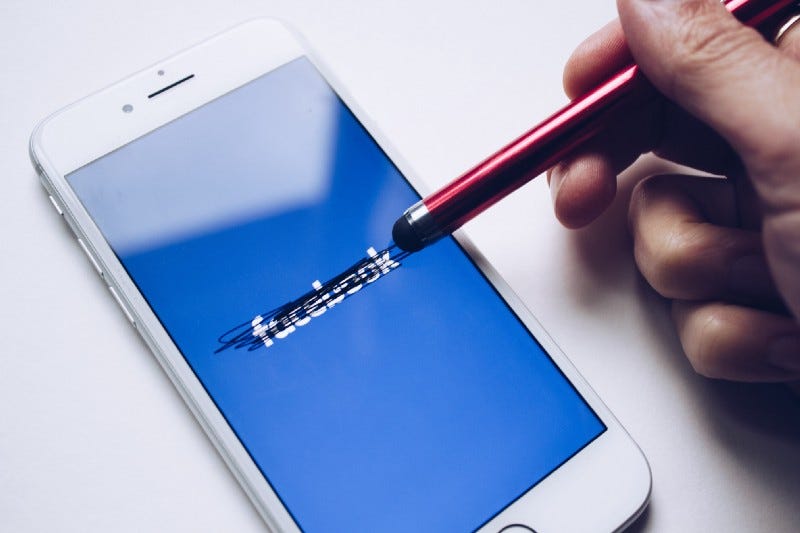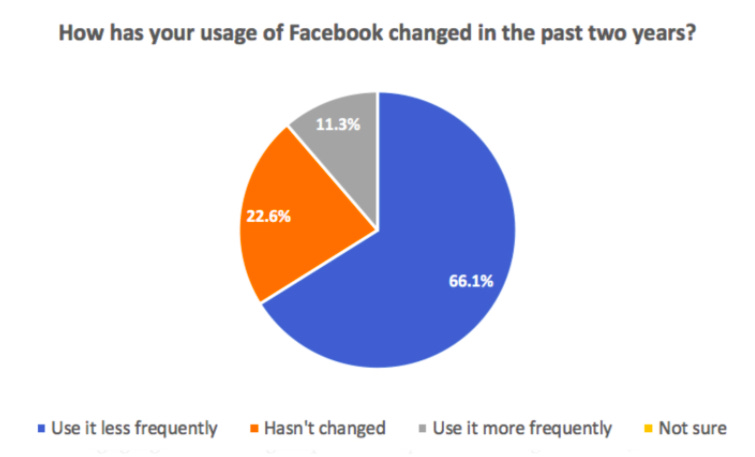Facebook Is Dead (It Just Doesn’t Know It Yet)
The $750+ billion company still has options, but none end well.
The $750+ billion company still has options, but none end well
Author’s update: This article is now available en Español and 日本!
I had a strange moment last week that helped me realize that Facebook — the social media platform I’ve used for more than a decade — is about to go extinct. And, like the dodo bird and carrier pigeon, it probably doesn’t see it coming.
I have the privilege of teaching Sunday school every week (via Zoom) to a bunch of fantastic teenagers aged 14–16. They’re all digital natives with a high degree of cultural savvy, a strong distaste for anything that violates their personal privacy, and a nose for political BS.
So naturally, none of them have Facebook.
I asked if any of their friends have it. They laughed. Not a single one could think of any friends who still had Facebook. One of the boys filled me in: “Dude…Facebook is for moms and grandparents.”
In truth, the reality for Facebook is actually far worse. The megalithic social media monopoly faces five potentially insurmountable challenges in the years ahead.
1. Gen Z Doesn’t Care
The under-18s have moved on: Tik Tok. Snap. Maybe IG. They want end-to-end encryption, they don’t want to be tracked, they’re afraid of online bullying and hate speech, and they don’t like ads.
Above all, they don’t want to be on the same social networks as their moms, dads, aunts, uncles, and grandparents.
To be clear, Facebook is still the leader among under-17s, but there’s no way they’ll keep that lead for long. In fact, there are already 2.6% fewer teenagers on the site compared to Q2 2019.
Facebook could potentially roll out some sort of Facebook-for-under-18s-only, but the kids probably still wouldn’t buy it.
2. Millennials Are Ready to Ditch
More and more of my friends are cutting the royal-blue cord, especially after watching The Social Dilemma or reading eye-opening books like The Shallows, Irresistible, Hooked, or Digital Minimalism.
Because let’s face it: Facebook is a hate machine, the kind of place where negative content goes viral far more reliably than positive content. Accordingly, mindful Millennials are getting wary.
Plus: They’re now officially too old to bicker with strangers and acquaintances online, they’re not interested in having their mood manipulated, they don’t have fifty spare minutes to waste on Facebook each day, and they can securely send their child/dog/dinner photos directly to their friends and parents without the app that Zuck built.
Also? They’re discovering that they don’t need media to be social. They still remember those wonderful days of analog friendship, and once there’s a COVID vaccine, expect them to do the hard work of building up real relationships instead of media-mediated digi-connections.
All told: Expect Millennials to abandon Facebook in vast numbers as soon as a viable contender emerges.
In the meantime, many more Millennials will do what I’ve done: They’ll install Newsfeed Eradicator to kill their scrolling addiction, then they’ll install uBlockOrigin and Ghostery to block all ads and tracking.
That’ll leave them with Messenger and the ability to occasionally creep a friend’s wall when the urge arises. At that point, they’ll already have one foot out the door.
3. The Right Will Soon Walk Out en Masse
I believe that the truth should never be censored. Not in the West, not in China, not in Russia. I’ve spent five days in totalitarian North Korea — it’s a place built on lies, and I am convinced that only the truth can set us free.
That said, social media platforms have started to “censor” provable lies, patent falsehoods, blatant misdirections, and foreign clickfarm-created “news” created expressly for the purpose of fomenting disunity in the West. The truth must never be censored, but we must stand guard against egregious and verifiable lies like “the earth is flat,” “vaccines kill babies,” and “Hilary Clinton runs a child sex ring under a pizza parlor.”
This sentiment infuriates people on the far right — because after all, who gets to determine “truth”? And it’s only a matter of time before tens of millions of ultra-conservatives ditch Facebook for a new social media platform that respects their right to be deluded.
In fact, there’s already a new social media platform that’s reached number one on the app store: Parler, the so-called “Free Speech Social Network.” (We won’t point out the irony of using a foreign word to discuss keeping out foreigners.)
4. So Will the Left
In addition to the far-right abandoning Facebook for their own echo chamber, expect to see the far-left do the same. After all, is it really woke to demand income equality while using a platform that enriches a 36-year-old with a net worth north of $100 billion?
With any luck, both sets of extremists will silo up in their echo chambers and let the rest of us return the offline world to a place of winsome, respectful, highly-productive civil discourse.
5. What’s Left Won’t Be Worth Keeping
The Gen Zers ditch, the Millennials ditch, the far-left ditches, the far-right ditches, and what remains? A boring, bloated middle. Near-nil cutting-edge content creators. The user base will be a bunch of non-political sixty-somethings who like cat pictures and dancing dog videos, plus a few trolls with too much time on their clammy hands.
You thought Myspace was bad? In five years, Facebook could be the most depressing place on the Internet.
So What’s Facebook to Do?
They have options:
Lean into their fastest-growing demographic: senior citizens. It’s not sexy, but heck, have you seen what Viagra commercials sell for? Obviously, there is nothing wrong with catering to Baby Boomers, but our youth-obsessed society will no longer see them as the leading platform if they do.
Lean no-holds-barred into clash-politics and clickbait conspiracy theories and ruin the world.
Invest a metric ton of cash in trying to convince the next generation that Facebook’s still the cool kid on the block, despite their aging platform and serious privacy concerns.
Keep acquiring real innovators like Instagram and WhatsApp (ie TikTok). This will certainly work in the short-term… until a barrage of anti-monopoly lawsuits breaks them all up again.
All of this inevitably leads to Facebook’s collapse.
That’s Impossible!
No, it’s not. While Facebook isn’t going away anytime soon — it still has over two billion daily active users — if Myspace taught us anything, it’s that when the world’s biggest social media site collapses, it effectively does so overnight.
It’s the Network Effect, but in reverse.
For those unfamiliar with Metcalfe’s Law, the theory posits that “the value of a network is proportional to the square of the number of connected users. As the physical cost of the network grows linearly, its value grows exponentially.”
Let’s assign everyone a value of 1.5. A network of 2 people is worth 2.25 (1.5 x 1.5). A network of 3 people isn’t worth 3— it’s worth 3.375. Facebook’s network of two billion is worth $750,000,000,000.
It’s we, the collective users, are what gives Facebook 100% of its value. The reality is that when my eight closest friends quit Facebook or switch platforms, I’ll never log in again.
While Facebook’s deflation may take longer than others due to its massive size — and, like Myspace, it will certainly continue to exist for decades in some form — it’s safe to say that its best days are in the past. Because it’s only a matter of time before the network effect breaks down.
Good News: Opportunities Abound
In the end, Facebook’s demise will actually be very good news for marketers, entrepreneurs, social media users, and the public at large.
For marketers, more platforms give more marketing options, more niche specificity, and less ad competition.
For entrepreneurs, there’s the opportunity to build bona fide, elegant, innovative Facebook challengers for the first time in a decade. As individualist-consumerist society grows, expect to see a proliferation of niche-specific sites in the years ahead. (And, perhaps ironically, some sort of master-site to access them all from a single app.)
For social media users, expect (or demand) to see the introduction of a User’s Bill of Rights, including beefed-up privacy standards, far-less addictive algorithms, innovative protection from foreign trolling, and perhaps even ad revenue sharing… go Medium! It’s our presence and content creation that gives these platforms all their power and profit, and it’s time they start treating us more like customers and contributors and less like the product being sold.
For the public at large, spreading our digital interactions across a larger swath of sites could lead to better protection of our data, some inventive weapons in the fight against the foreign interference that undermines democracy and civil discourse, and a non-monopolized ecosystem of diverse platforms from which to express real truths without censorship.
Perhaps we can fix this thing after all.
UPDATE:
A few days after publishing this story, Jared was suddenly and mysteriously unable to access the dashboard of his Facebook Fanpage. It was down for more than a week and continues to mysteriously go down for days at a time.
Please follow Jared on Medium for more insights.
Read the rest of the series:
Uber and Lyft Are Dead (They Just Don’t Know It Yet)
$200 million + Dark Marketing can buy you a law, but it can’t bury corruption
Airbnb Is the Next Groupon (It Just Doesn’t Know It Yet)
The future is bleak for the world’s biggest broker of ghost hotels
Instagram Is Dead (It Just Doesn’t Know It Yet)
The first of the major selfie apps certainly won’t be the last
Mailchimp Is Dead (It Just Doesn’t Know It Yet)
There’s a new 800-pound gorilla in the email marketing jungle, and its name is Amazon








